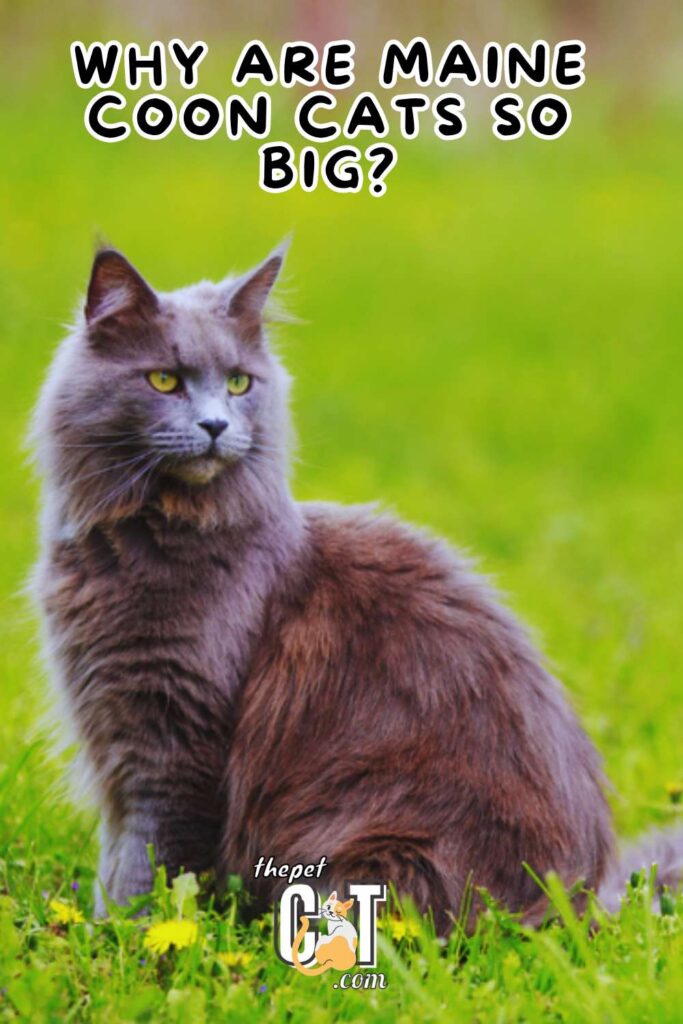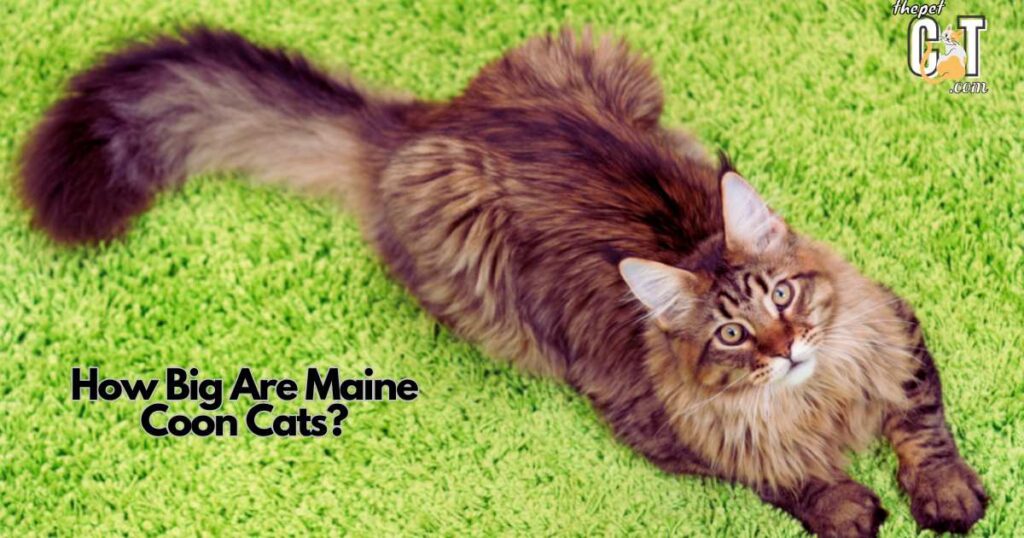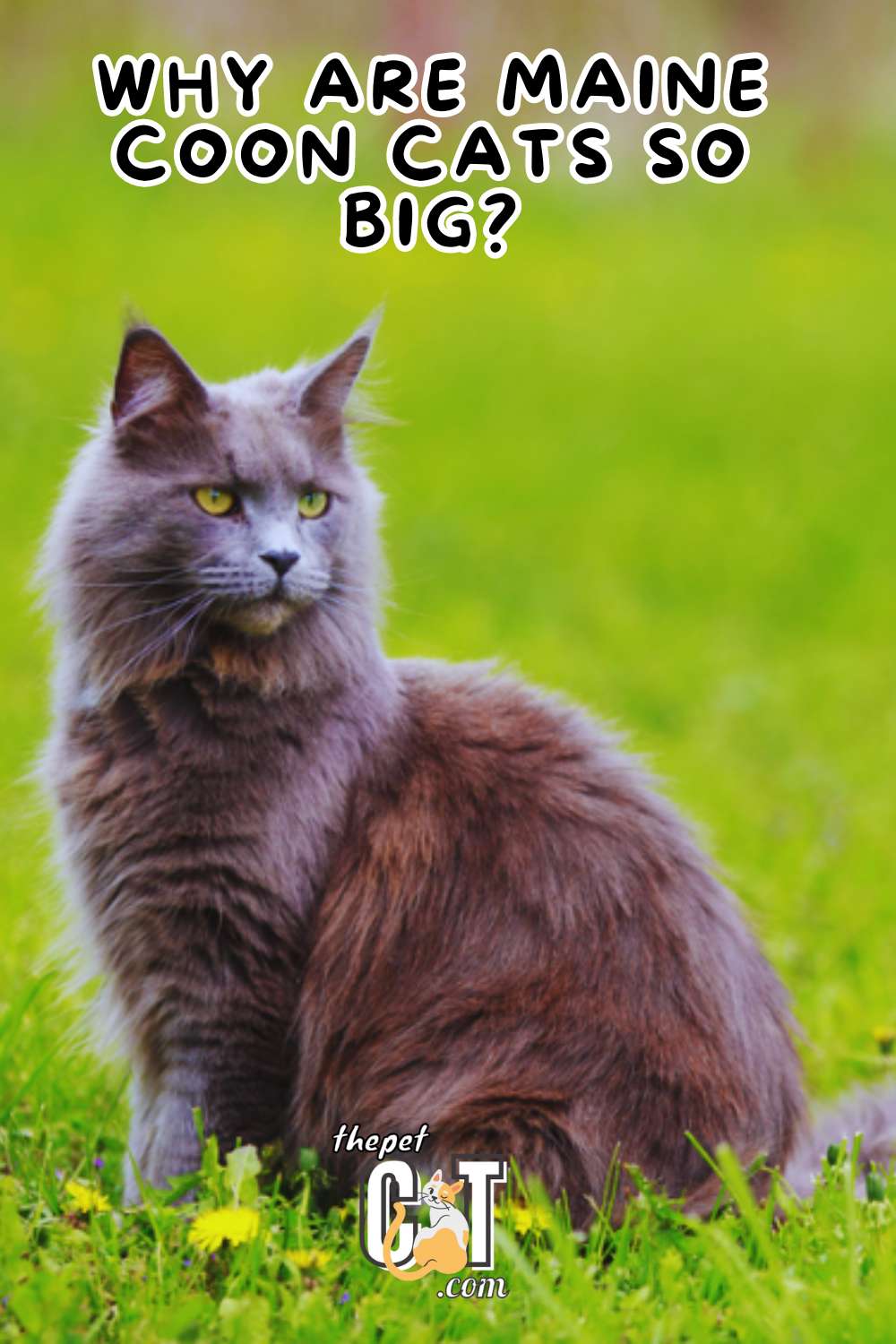Maine Coon cats are considered one of the largest domesticated breeds due to various factors. The factors include genetic roles influenced by Pkd1 and Mc1r type genes or their northern heritage, natural habitat, etc.
Furthermore, their diet, rich in proteins and fats, has facilitated their robust development. Their larger paw size and strong musculoskeletal system have aided in adapting to their native habitat.
Knowing these influences can help you understand the interesting reasons behind the Maine Coon’s large size. To know more details on Why Are Maine Coon Cats So Big including Are all they big, how big they are at different ages, When a Maine Coon is big for the wrong reason, etc.
Why Are Maine Coon Cats So Big?

Maine Coon cats are known for their large size and friendliness. Many things, like genes and where they live, make them large. Let’s explore why they’re one of the biggest pet cats.
1. Genetic Influences
The impressive size of Maine Coons is linked to certain genes like Pkd1 and Mc1r.
The Pkd1 gene normally regulates kidney growth. It also affects body size when it undergoes mutations.
Similarly, changes in the Mc1r gene, which controls coat color, might influence melanin production and, thus, body size.
These genetic factors are combined with breeding practices, diet, and environment. Collectively, they can contribute to a significant increase in size, with some individuals reaching weights of over 20 pounds.
2. Natural Habitat
The natural habitat of Maine Coons, like cold climates and ample prey, affects their large size. In the wild, they eat a lot of protein and fat from rodents and birds.
This diet, plus needing to stay warm in the cold origin area, helps them grow big. Also, being active outdoors helps build muscle.
All these things add up to the Maine Coon breed usually being quite large, with males weighing 13 to 18 pounds (5.9 to 8.2 kilograms) and females 8 to 12 pounds (3.6 to 5.4 kilograms).
3. Slow Growth Rate
Maine Coons grow slowly compared to other cats, continuing to get bigger until they’re around 3 or 4 years old. This gradual growth over a longer period lets them become larger than many other breeds. So, their slow and steady growth contributes to their impressive size.
4. Evolutionary Advantage
Evolutionary advantage means having traits that help an animal survive and reproduce better in its environment.
For Maine Coon cats, this could mean being larger and having thicker fur. This feature might help them hunt effectively and stay warm in harsh winters.
Moreover, this might give them a better chance of thriving and passing on their genes to the next generation. That’s maybe why today’s Maine coon breeds big size due to their ancient parents.
5. Selective Breeding
Over time, breeders deliberately selected larger Maine Coons for breeding, leading to the development of a distinctive breed with an average weight range of 13 to 18 pounds, while exceptional individuals can reach weights exceeding 20 pounds.
6. Nutrition and Diet
Maine Coons’ diet is naturally high in protein and fat. This facilitates their robust growth. Their dietary habits, including consuming meat-based products, contribute to their average size range of 10 to 16 inches in height and 13 to 18 pounds in weight.
7. Environmental Adaptation
Maine Coons are known for their large size. They have evolved to thrive in cold climates like Maine. Their big build helps them stay warm in chilly environments.
Research indicates that Maine Coons typically weigh between 10 to 25 pounds, with some exceptional cats weighing up to 30 pounds.
Their bigger paws and strong bones give them better balance and movement, especially in snowy or rough areas.
These adaptations have helped Maine Coons succeed in their environment. This may make them bigger and better equipped for survival.
8. Longevity
Maine Coons have a longer lifespan compared to many other domestic cat breeds. This allows them more time to achieve their maximum size potential.
They have ample time for significant growth and development, with a life expectancy of 12 to 15 years.
9. Intact Natural Behaviors
Preserving their natural behaviors, including active hunting and exploration, ensures that Maine Coons remain physically engaged, contributing to their muscular build and healthy growth throughout their lifespans.
10. Hybridization
Some historical theories propose that Maine Coons’ substantial size might be a result of interbreeding with other larger domestic or wild cat species. This potentially influences their genetic makeup and physical characteristics over generations.
11. Body Structure
Maine Coons’ solid bone structure and muscular build are key to their size. Their strong bones and well-developed muscles support their large frame, allowing them to carry their weight effectively. This robust physique enables them to move easily and improves their appearance.
Are All Maine Coon Cats Big?
No, Not all Maine Coon cats are big. While generally among the largest domestic breeds, their size can vary due to genetics, gender, and health. Males average 15-25 pounds (6.8-11.34 kg), with some surpassing this.
Females weigh 10-15 pounds (4.54-6.8 kg), around 10% less than males. Proper nutrition, exercise, and vet checkups are crucial for their well-being. The gentle giants are admired for their friendly attitude.
How Big Are Maine Coon Cats?

Maine coon big size is one of the reasons for their fame. Their giant size makes them unique from different cat breeds. Adult males can weigh up to 25 pounds, while females normally weigh 10-14 pounds.
They usually achieve their maximum weight by 3 to 5 years old. As kittens, they start off smaller, around 3.5 to 4.5 pounds at 3 months old. Maine Coons are popular companions due to their calm and friendly manners, despite their large size.
Let’s see a chart that can offer you an overview of the size of a Maine coon cat, male and female.
| Age | Female | Male |
| Newborn | 0.2-0.3 Ibs | 0.2-0.4 lbs |
| 3 Months | 0.3 – 0.6 lbs | 0.4 – 0.6 lbs |
| 6 Months | 7-10 Ibs | 8-11 lbs |
| 9 Months | 9-12 lbs | 12-16 lbs |
| 1 year Old | 10-15 lbs | 13-20 lbs |
| 1.5+ years Old | 12-18 lbs | 15-25 lbs |
Read More:
When a Maine Coon is Big for the Wrong Reason?
When a Maine Coon seems very big, it could mean some health issues, especially if it’s because they are too heavy. This might lead to diabetes, joint problems, and a shorter life.
Eating too much, not moving around much, or not eating the right things can make a Maine Coon gain too much weight.
Checking what they eat, getting them to play more, and asking a vet for advice can help keep a Maine Coon healthy and prevent any problems that come with being too big.
Why Some Maine Coons Are Smaller Than Expected?
The reasons why some Maine Coons are smaller than expected:
- Maine Coon mixes or cats with no Maine Coon genes can be mistaken for the breed.
- Runts of the litter, born smaller than their siblings, might not reach typical size.
- Malnutrition or poor health can also stunt growth.
- Research indicates that around 1 in 4 Maine Coons may not meet the typical weight range due to these factors.
How Big Was the Largest Maine Coon on Record?
Stewie, a Maine Coon from Reno, Nevada, holds the title of the largest Maine Coon cat ever, measuring a remarkable 48.5 inches in length, significantly surpassing the typical 19-30 inches for male Maine Coons.
Despite his exceptional size, Stewie was known for his gentle and friendly nature, earning him the nickname “gentle giant.” Notably, he was certified as a therapy animal and brought joy and comfort to residents in local senior citizen centers. Stewie’s extraordinary size and kind demeanor left a lasting impression, solidifying his place in the hearts of many.
How Does a Maine Coon Compare to an Average Cat?
The Maine Coon is considerably bigger than the normal house cat. This measures 19-40 inches in length and 10-16 inches in height. Cats typically measure 18 inches in length and 9-10 inches tall.
This notable size difference often leads to cases where the Maine Coon is mistaken for larger, wild predators like bobcats or lynxes. The Maine Coon’s substantial dimensions make it easily recognizable and contribute to its distinction as one of the largest domestic cat breeds.
FAQs
How Big Should a Maine Coon Be at 6 Months?
A six-month-old Maine Coon should weigh around 7-10 lbs, with some males potentially reaching up to 13 lbs. This age provides a good gauge before hormonal changes impact growth, allowing for a relatively consistent size assessment among young Maine Coons.
Is There a Cat Breed Bigger Than Maine Coon?
Yes, the Savannah cat, a hybrid of wild servals and domestic house cats, can surpass the Maine Coon in size. These felines may attain heights of 17 inches and weigh more than 25 pounds. This makes it one of the most massive domestic cat breeds.
Can Maine Coon Cats Be Small?
Yes, Maine Coon cats can indeed be small. Although it’s uncommon among purebred individuals, occasional runts or slow-growing cats exist within the breed. Additionally, factors like poor diet or mistreatment can contribute to stunted growth in Maine Coons, especially in rescued or feral cats. Regular vet checkups and proper care are crucial for their well-being.
How Do I Know if My Maine Coon Will Be Big?
Some signs can indicate whether your Maine coon cat size will grow to be a large cat. Look for:
1. Large paws
2. Long body
3. Substantial facial features
4. Heavy, dense bone structure
5. Thick, bushy tail.
Final Verdict
Maine Coon cats are recognized for their size and friendliness. Males typically weigh 15-25 pounds, while females weigh 10-15 pounds.
Some might be much heavier! These cats require proper nutrition, exercise, and regular veterinary checkups. Not all of them will be large, but they all need love and care. Their large size helps them survive in cold places. With their large stature, they are calm, friendly, and ideal pets for many people.
You May Also Like to Read:

